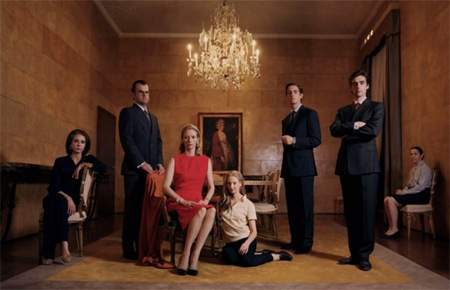I Am Love
A powerful portrayal of a woman caught between the constraints of societal expectation and an innate desire for freedom and self-expression.
Overview
From the opening frame of this starkly elegant familial drama, there is a sense that we are being steered along a fastidiously calculated course by a team of highly trained navigators. Each extravagantly stylised shot is defined by a purpose, each sweeping metaphor glaringly apparent and each subtle nuance carved into a meticulous performance by Tilda Swinton is decidedly done.
We first meet Emma (Swinton) gracefully directing the proceedings of an opulent dinner party for her ageing father-in-law, the patriarch of the Recchi clan and founder of an exceedingly successful textile company in Milan. Clearly Emma is well versed in such things, coordinating the event with seamless, almost mechanical ease. We immediately get the sense that this is how she conducts her life and has done since leaving her native Russia to marry Tancredi (Pippo Delbono), who shares heirship to the Recchi throne with his eldest son Edoardo (Flavio Parenti). She is skillfully playing the role required of her as a "Recchi woman" — dutiful wife, mother and honorary Italian — yet nothing seems to land.
Her life, like the immaculate art deco villa she and her family inhabit, is a beautifully designed, gilded cage that engulfs her entirely. When Emma is introduced to Edoardo’s new friend and talented young chef Antonio (Edoardo Gabbriellini), we see in her the first spark of what will later become a monstrous flame of passion and the beginnings of a familiar, Shakespearean tragedy-like course of action.
I am Love (Io sono l’amore) has been more than seven years in the making and is the collaborative effort of Swinton and Sicilian-born director/co-writer/producer Luca Guadagnino. Its lengthy gestation period is evident throughout the highly polished finished product — each cinematic choice seeming at times a little too deliberate, from the dramatic operatic score by esteemed composer David Adam to the lush, expansive cinematography by Yorick Le Saux (Swimming Pool).
The painstaking attention to aesthetic certainly makes for a stunning visual feast — with lingering shots of the seductive European countryside, architecture and cuisine — but, unfortunately, tends to swallow the intimacy between characters and overwhelm the narrative. However, the intrigue and complexity of this film does not lie within the storyline itself, which follows an obvious course and indulges a little too often in bloated metaphor; rather, it is etched into Swinton's delicately nuanced performance. The result: a powerful portrayal of a woman caught between the constraints of societal expectation and an innate desire for freedom and self-expression.





